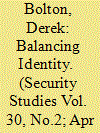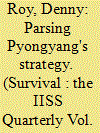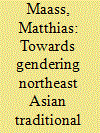| Srl | Item |
| 1 |
ID:
180458


|
|
|
|
|
| Summary/Abstract |
Scholarship on ontological security (OS), the security of being, reveals how national narratives delineate communities within which individuals have OS and how the corresponding self-interest in upholding these narratives influences foreign policy. A hereto-unexplored implication of these works is how the desire to maintain national narratives influences decisions on balancing and bandwagoning. The article uses Raymond Aron’s classical realism to develop an OS theory of balancing, drawing upon what it argues are his “early OS intuitions.” Specifically, using Aron’s concept of “secular religion,” the article shifts the analytical focus of current ideological approaches of balancing toward the “secular religion” of nationalism. It argues decisions on balancing and bandwagoning are made with reference to perceived (in)compatibility between national narratives and the distribution of power. The case of North Korean responses to the Sino-Soviet split demonstrates the utility of an OS perspective on balancing compared to traditional balance of power formulations.
|
|
|
|
|
|
|
|
|
|
|
|
|
|
|
|
| 2 |
ID:
095998


|
|
|
|
|
| Publication |
2010.
|
| Summary/Abstract |
North Korean behaviour that appears intended to raise tensions with Pyongyang's adversaries is not only vexing but puzzling. The North Koreans periodically throw up obstacles to the economic cooperation their country desperately needs, including harassment of the joint North-South industrial zone in Kaesong. Pyongyang often speaks as if it welcomes a fight with the United States and South Korea, its strongest potential adversaries. With its second nuclear test in May 2009, Pyongyang clearly angered even its important partner China, a major supplier of such basic needs as food and energy. If fear of aggression by the United States and its allies is a principal driver of North Korean foreign policy, why do the North Koreans frequently risk providing the putatively aggressive Americans further motivation to attack? Some observers argue, for example, that transfer of nuclear material or technology is extremely unlikely because Pyongyang is deterred from crossing what is clearly a red line for the United States that would bring massive military retaliation. Yet North Korean officials have more than once threatened to cross that line, seemingly for the purpose of frightening the Americans by playing on one of their worst fears.
|
|
|
|
|
|
|
|
|
|
|
|
|
|
|
|
| 3 |
ID:
131269


|
|
|